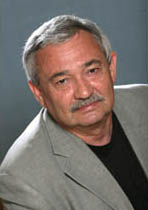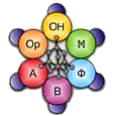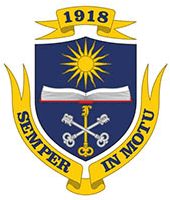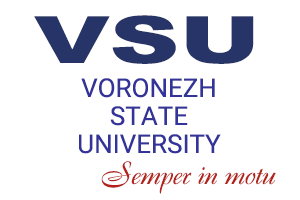Dean

Viktor N. SEMYONOV
Address: Room 269, building 1, 1 Universitetskaya pl., Voronezh
Phone: +7 (473) 228-11-60 (1200); +7 (473) 220-87-97
E-mail: deanery@chem.vsu.ru
Website: www.chem.vsu.ru

Departments
- Department of Analytical Chemistry
- Department of High Molecular Compounds and Colloidal Chemistry
- Department of Materials Science and Nanosystem Technologies
- Department of General and Inorganic Chemistry
- Department of Organic Chemistry
- Department of Physical Chemistry
The Faculty of Chemistry offers higher education of the international level in the field of materials science, technologies for synthesis, and analysis methods
- One of the oldest faculties of the university (first study and research laboratories were created in 1918 by Professor A.D. Bogoyavlensky and assistant N.I. Vinogradov)
- Maintaining the traditions of a classical higher education school and active development and use of modern education technologies
- Creating and implementing innovative, practice-oriented education programmes, including specialist’s, bachelor’s, master’s degrees, and PhD programmes
- Research centre in the field of chemistry in the Central Black Earth Region in Russia
- Unique research equipment
- Close partnerships with employers, a vast network of connections with leading Russian and international universities
Bachelor's degree
- 04.03.01 Chemistry (full-time)
Fields of study:- Applied Chemistry
- Theoretical and Experimental Chemistry
- 04.03.02 Chemistry, Physics, and Mechanics of Materials (full-time)
Field of study: Materials Science and Nanosystem Technologies
Master's degree
- 04.04.01 Chemistry (full-time)
Programmes:- Organic Chemistry
- Physical Chemistry
- 04.04.01 Chemistry (part-time)
Programme: Chemical Expertise - 04.04.02 Chemistry, Physics, and Mechanics of Materials (full-time)
Programme: Chemistry, Physics, and Mechanics of Function Materials and Nanomaterials
Specialist's degree
- 04.05.01 Fundamental and Applied Chemistry (full-time)
Specialisation: Fundamental Chemistry in Professional Education
Postgraduate Training Programmes
- 04.06.01 Chemical Sciences
Fields of study:- Analytical Chemistry
- High-molecular Compositions
- Inorganic Chemistry
- Organic Chemistry
- Electrochemistry
Duration
- Bachelor’s degree programmes (full-time): 4 years
- Specialist’s degree programmes (full-time): 5 years
- Master’s degree programmes (full-time): 2 years
- Master’s degree programmes (extramural): 2 years 5 months
- Postgraduate training programmes (full-time): 4 years
Academic Staff
- 1 academician
- 25 professors
- 27 associate professors
- 12 lecturers
Educational facilities / resources
Research laboratories and rooms
- Research and Education Centre “Ionites and membranes”
- Joint Research Laboratory of VSU and A.N. Frumkin Institute of Physical Chemistry and Electrochemistry of the Russian Academy of Sciences “Ion exchange chromatography”
- Joint Research Laboratory of VSU and A.N. Frumkin Institute of Physical Chemistry and Electrochemistry of the Russian Academy of Sciences “Adjoint processes in Electrochemistry and Metal Corrosion”
- Laboratories of tensometry, thermodynamics of phase equilibria of corrosion in metals and alloys, photoelectrochemistry, physicochemistry of metal-polymer systems, and electrocatalysis
- Electrochemical stations (IPC-Compact, IPC-Pro L, IPC-Pro MF, P-20X, P-40X) and computer equipment with specialised software (Comsol Multiphysics, Mathematica, Matlab)
- 8 laboratories for synthetic and physicochemical research in the field of organic chemistry
Key areas of research
- Department of Analytical Chemistry:
- Physicaland chemical principles of membrane and sorption processes of extractingand purification of physiologically active substances
- Thermodynamicsof equilibrium and nonequilibrium processes with the elements ofself-organisation in ionites and membranes
- Studyof supramolecular processes with ion exchangers and membranes; sensingtechnologies
- Computermodelling of ion-exchange and membrane processes
- Nanocompositeswith electrocatalytic properties based on natural and synthetic sorbents
- Synergeticsand fractal representations during the interaction of ionite, solvent, andphysiologically active substance
- Physico-chemicalprocesses in ionites under the action of temperature, electric, magnetic,and mechanical fields
- Department of Physical Chemistry:
- Creatingelectrocatalysts for the chemical sources of currents, electrochemicalenergy storage devices, and sensors
- Chemicaland electrochemical deposition of functional coatings for micro andnanoelectronics and corrosion protection
- Synthesisof semiconductor metal-oxide films for micro and optoelectronics, photo(electro) catalysis, energy production, and chemical and biologicalsensory studies
- Establishingthe kinetics and mechanism of electrocatalysis processes and hydrogenationof metals and alloys to solve problems of corrosion, electrochemical, andhydrogen energetics
- Department of General and Inorganic Chemistry:
- Physicochemicalanalysis of semiconductor and metal systems
- Modellingphysicochemical processes in multicomponent heterostructures
- Purposefulsynthesis of thin-film heterostructures based on coordination compounds
- Department of Organic Chemistry:
- Development of new biologically active substances, including:
- Blood thinners based on polyazaheterocyclic systems.
- Protein kinase inhibitors with potential anticancer activities.
- Antimicrobial substances.
- Substances with an antifungal effect.
- Compounds with hybrid biological action (antimicrobial and antifungal, antimicrobial and anticoagulant at the same time).
- Development of new plant growth regulators for agricultural needs.
- Development of new inhibitors of metal corrosion:
- Inhibitors of corrosion of copper, copper alloys, and steels to be used in various industries, including water supply equipment and coating compositions.
- Inhibitors of acid corrosion of steel to be used, for example, in the oil producing industry.
- Development of synthesis methods and studying the properties of SAS and emulsifiers based on plant raw materials and wastes of oils and fats production to be used in various industries, including cosmetic, construction, oil-production, etc.
- Development of new biologically active substances, including:
- Department of high-molecular compounds and colloid chemistry:
- Obtaining and study of new water-soluble complexing agent polymers, synthesis and study of net polymers
- Obtaining new effective polymer sorbents and nanocomposites
- Study of water dispersions of polymers and micelle forming surface-active substances
- Study and introduction of a new type of highly-efficient cost-effective coagulants into industrial practice
- Colloid-chemical study of various recycling methods for wastes of oils and fats production
- Department of Materials Science and Nanosystem Technologies:
- Creating functional thin-film materials and coatings using vacuum technologies
- Synthesis of crystals and heterostructures of multi-component semiconductors
- Chemically stimulated oxidation of semiconductor crystals
Research facilities / resources
- Research and Education Centre “Ionites and membranes”
- Joint Research Laboratory of VSU and A.N. Frumkin Institute of Physical Chemistry and Electrochemistry of the Russian Academy of Sciences “Ion exchange chromatography”
- Joint Research Laboratory of VSU and A.N. Frumkin Institute of Physical Chemistry and Electrochemistry of the Russian Academy of Sciences “Adjoint processes in Electrochemistry and Metal Corrosion”
- Laboratories of tensometry, thermodynamics of phase equilibria of corrosion in metals and alloys, photoelectrochemistry, physicochemistry of metal-polymer systems, and electrocatalysis.
- Electrochemical stations (IPC-Compact, IPC-Pro L, IPC-Pro MF, P-20X, P-40X) and computer equipment with specialised software (Comsol Multiphysics, Mathematica, Matlab) that allow conducting research in the field of physical chemistry, electrochemistry, and quantum chemistry at the modern level of hardware
- 8 laboratories for synthetic and physicochemical research in the field of organic chemistry. Structures of compounds are studied using modern FT-IR spectrometers such as Avatar and Vertex 70, a Shimadzu 1240 spectrometer, Shimadzu 6000 and THERMO ARL XTRA X-ray diffractometers, as well as a 1100 LCMSD chromatography-mass spectrometer (Agilent Technologies), and a Photocor Complex multi-angle spectrometer with dynamic and static light scattering. Microwave activation of organic reactions is held in an LG MS1724W microwave oven and on a Milestone MicroSynth laboratory station (2450 MHz, internal temperature control, made in Italy in 2010)
Further information
The faculty publishes scholarly journals “Condensed Matter and Interphases” and “Sorption and Chromatography Processes” included in the list of the journals recommended by the State Commission for Academic Degrees and Titles and indexed in the Scopus international database), as well as “VSU Vestnik” (“Chemistry, Biology, Pharmacy” series together with the Faculty of Biology and Soil Sciences and the Faculty of Pharmacy). The faculty regularly organises and holds scientific conferences.
International partner universities
- Carl von Ossietzky University (Oldenburg, Germany)
- V.N. Karazin Kharkiv National University
- Qingdao University of Science and Technology (China)
- Belarus State University (Minsk, Republic of Belarus)
- Indian Institute of Technology in Guwahati
- Pharmacy School at the Aristotle University of Thessaloniki (Greece)
- National Chemical Engineering Institute in Paris (France) (Professor Polina Volovich)
- National Institute of Technology in Kurukshetra (India)
International programmes and projects
Employees, students, and postgraduates of the faculty take part in international research grant programmes and projects:
- “Mikhail Lomonosov” (2019) organised by the German Academic Exchange Service (DAAD) and the Ministry of Education and Science of the Russian Federation,
- The Programme of the Government of India (GIAN),
- The Programme of the Government of France (“Mechnikov”).
International cooperation in the area of education
The faculty offers:
- Programmes for students and master's students from Ethiopia, Benin, Vietnam, China, Ukraine, Turkmenistan, and other countries
- Introductory training and internships for students of the Faculty of Chemistry from the Carl von Ossietzky University of Oldenburg (Oldenburg, Germany)
- Programmes for postgraduate students and defence of PhD theses by international students
Voronezh State University • 1997–2025

